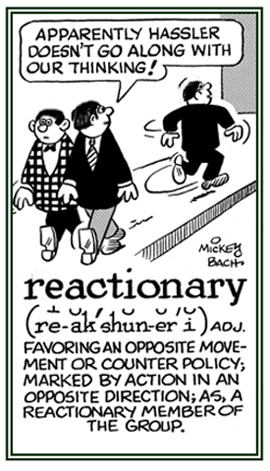ag-, agen-, act-, agi-, agit-
(Latin: to set in motion, to hurry, to shake; to drive; to do, to act; to lead, to conduct, to guide)
Condensation of protein material by the controlled use of an intense beam of light: Photocoagulation is used especially in the treatment of retinal detachment and the destruction of abnormal retinal vessels, or of intraocular tumor masses.
Photocoagulation is a technique that uses intense light energy, as from a laser, to produce scar tissue used in treating certain eye disorders, in medical and biological research, etc.
proactive (adjective), more proactive, most proactive
A reference to an action or a person that acts in advance to deal with an upcoming change or problem: Susan took proactive measures by saving some money each month for times when she needed it quickly.
prodigal (adjective), more prodigal, most prodigal
1. Descriptive of someone who is a spendthrift and reckless with money and other valuable goods: Karl's neighbor has nothing left of his inheritance because of his prodigal behavior and excessive way of living.
2. Referring to the expenditure of large amounts of funds without thinking of the future: There have been rumors that the company's CEO (chief executive officer) has been using prodigal money from the business which he has no right to.
3. Etymology: from Latin prodigere, "to drive forth, to use up, to waste"; derived from Latin prodigus, "spend thrift" and the rare word prodigalitas, from which the words prodigality and prodigal came into English.

© ALL rights are reserved.

© ALL rights are reserved.
Go to this Word A Day Revisited Index
2. Referring to the expenditure of large amounts of funds without thinking of the future: There have been rumors that the company's CEO (chief executive officer) has been using prodigal money from the business which he has no right to.
3. Etymology: from Latin prodigere, "to drive forth, to use up, to waste"; derived from Latin prodigus, "spend thrift" and the rare word prodigalitas, from which the words prodigality and prodigal came into English.


Go to this Word A Day Revisited Index
so you can see more of Mickey Bach's cartoons.
Lavishness and extravagance in spending: The prodigality of some politicians often results in higher taxes for the citizens and has no real value for the populations.
prodigally (adverb), more prodigally, most prodigally
Descriptive of how something is completely useless or of no value: The prodigally wasteful use of some government expenditures are unjustified and cause more burdens for taxpayers, such as building high ways where very few people live.
psychoactive (adjective), more psychoactive, most psychoactive
In pharmacology, relating to something that affects the mental state or mind: Such drug as LSD or DM have psychoactive effects.
Some medicines or drugs possess psychoactive abilities to alter mood, anxiety, behavior, cognitive processes, or mental tension.
Any condition that results from saliva: A ptyaloreaction response to mouth secretion can be of a chemical or biological one.
radioactive (adjective), more radioactive, most radioactive
Referring to a particular type of energy-emitting thing or matter: Radioactive objects can be the sun or even an x-ray device or machine.
The release of energy from atomic nuclei: There are four different kinds of radioactivity including neutron radiation, beta radiation, alpha radiation, and corpuscular radiation.
Radioactivity can be very harmful when a person is exposed to high doses of it.
ramifactive (adjective), more ramifactive, most ramifactive
1. A usually unintended consequence of an action, decision, or judgment: The ramifactive conclusion to the issue complicated the situation and made the intended result more difficult to achieve.
2. Referring to the formation or development branches: The soil in Janet's garden was quite infertile, but nevertheless the ramifactive growth including nice foliage could be perceived!
2. Referring to the formation or development branches: The soil in Janet's garden was quite infertile, but nevertheless the ramifactive growth including nice foliage could be perceived!
react (verb), reacts; reacted; reacting
1. To behave or to change in a particular way in response to or under the influence of some stimulus or prompting: When Lynn's friend told Mr. Todd what happened, he reacted with sadness.
2. To respond to something by showing the feelings or thoughts it arouses: Most people reacted in a positive way to the smoking ban in restaurants.
3. To respond to some notification or stimulus by taking action: The firefighters reacted quickly when they heard the alarm.
4. To respond to or to be affected by a medication, drug, food, air pollution, etc. and usually in a negative or bad way: Rose physically reacted and felt terrible after she took a dose of the medicine which was prescribed by Dr. Small.
2. To respond to something by showing the feelings or thoughts it arouses: Most people reacted in a positive way to the smoking ban in restaurants.
3. To respond to some notification or stimulus by taking action: The firefighters reacted quickly when they heard the alarm.
4. To respond to or to be affected by a medication, drug, food, air pollution, etc. and usually in a negative or bad way: Rose physically reacted and felt terrible after she took a dose of the medicine which was prescribed by Dr. Small.
1. The way anyone acts or feels in response to something which happens, is said, etc.: When Tim's mother told him what had happened to his sister, his immediate reaction was one of shock and disappointment.
The newspaper received a lot of angry letters in reaction to the editorial about wasting too much money on the elderly.
2. The ability to act and to move quickly in order to avoid some sudden danger: Because Shirley was such a good driver, her quick reactions when another car was coming towards her on the wrong side of the road saved her life and her sister's life.
reactionary (adjective), more reactionary, most reactionary
1. A reference to a response which is strongly opposed to any new approach to what one is convinced is correct and appropriate: The politician's reactionary policy did not stop the movement for political and social reforms advocated by other members of his party.
2. Etymology: from Latin reactionnaire, "to favor a return to a previous state of affairs."

© ALL rights are reserved.
Go to this Word A Day Revisited Index
2. Etymology: from Latin reactionnaire, "to favor a return to a previous state of affairs."

Go to this Word A Day Revisited Index
so you can see more of Mickey Bach's cartoons.
reactivate (verb), reactivates; reactivated; reactivating
To cause something to start working or happening again: Mr. Big had to reactivate the fire alarm after the batteries had been replaced.
Once Mr. Martin paid his overdue telephone bill, he was able to get his phone service reactivated.
A matter or substance that is implemented in order to produce a chemical reaction: Ted's chemistry teacher showed the students how a reagent could produce red and blue smoke to appear!


